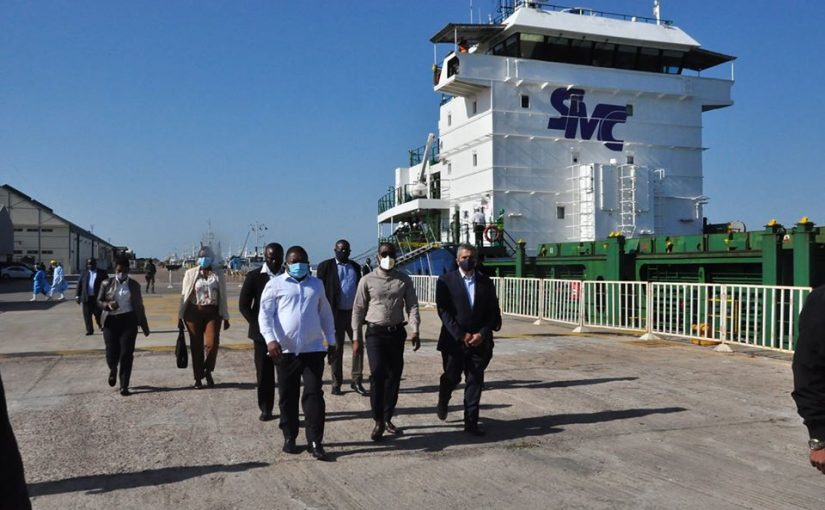Mozambique: Minister Muhate strengthens strategic partnerships in Geneva
Mozambique: Coastal shipping service resumes

All photos: Social Media
After a hiatus of about 30 years, a coastal shipping service resumed in Mozambique on Wednesday.
The service will carry goods by sea from Maputo to the district of Palma in the far north, with stops at the ports of Beira, Quelimane, Nacala, Pemba and Mocimboa da Praia.
President Filipe Nyusi inaugurated the new service at a ceremony in Maputo port. The operations, along what is being described as “a marine highway”, will be guaranteed by two ships owed by the Mozambican Coastal Shipping Company (SMC), which has invested around six million dollars.
SMC is a public-private enterprise between the French company Peschaud Moçambique (with 75 per cent of the shares) and the state-owned Transmarítima (25 per cent).
According to SMC project manager Pedro Monjardino, the new service is the result of two years of intensive work undertaken by specialists in various areas, and which involved the Transport Ministry, the Customs Service and the Mozambican Tax Authority.
“The purpose was to increase the control of tax revenue, and to endow the new coastal shipping customs regime with simplified, less burdensome procedures, and which respond to the criticisms made in the past, which at the time made the service non-viable”, said Monjardino.
He added that the Mozambican government is completely open “to finding new solutions that will now be put into practice”.
The general manager of SMC, and representative of the Peschaud Group in Mozambique, Luis Archer de Carvalho, said the project shows the Group’s commitment to contributing to the sustainable development of Mozambique in the medium and long term.
One of the two ships, the “Greta”, currently moored in Maputo, is a multi-use vessel which can carry both general and containerised cargo. It has the capacity to hold 260 containers, and two 60 tonne cranes.
The second ship, the “Ylang”, can carry 450 tonnes of merchandise and a 30 tonne crane. It is certified to dock at the quay of the natural gas processing complex in the Bay of Afungi, in Palma district. The “Ylang” is currently working along the Cabo Delgado coast, between Pemba, Mocimboa da Praia and Afungi, at the service of the natural gas companies.
Nyusi declared that the country needs more coastal shipping operators, to make the activity competitive, and reduce the final price of the goods transported.
Incentives had been introduced, he said, including the introduction of special registration of foreign ships to operate in coastal shipping, a special customs regime and reductions of 50 per cent and even 75 per cent in the fees to be paid to the National Hydrographic and Shipping Institute and to the National Marine Institute.
Coastal shipping vessels, Nyusi added, would be granted priority in mooring, and would receive a 50 per cent reduction in port fees.
These incentives, he said, are intended to attract further investment in the transport of goods and passengers along the Mozambican coast.
Nyusi wanted to shift transport of freight and of passengers away from the roads and onto ships. Excessive use of the roads has ed to their rapid deterioration, as can be readily seen on the main north-south highway (EN1).
Transporting goods by sea involved economies of scale, said the President, which could make areas of the economy such as agribusiness more competitive.
The Minister of Industry and Trade, Carlos Mesquita, said the drinks industries, particularly the breweries, could be major beneficiaries of coastal transport. The costs of transport, he estimated, would be eight to ten per cent lower, when compared with road transport, and this reduction should be passed on to the final consumer.
Coastal transport was a major factor in the Mozambican economy in the early 1980s, when 21 ships carried goods up and down the coast. About 250,000 tonnes of merchandise a year was transported on these vessels. There has never been any full explanation as to why this once thriving sector was allowed to collapse.















Leave a Reply
Be the First to Comment!
You must be logged in to post a comment.
You must be logged in to post a comment.